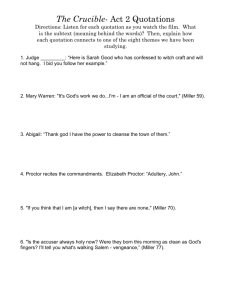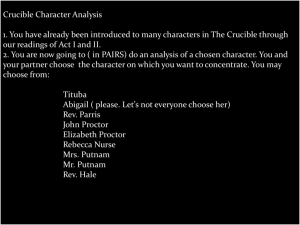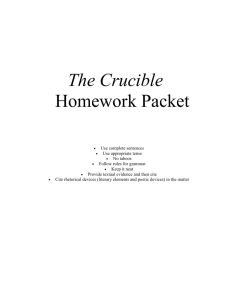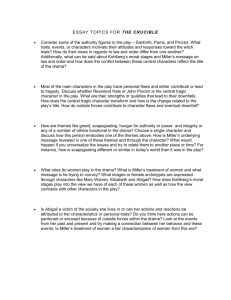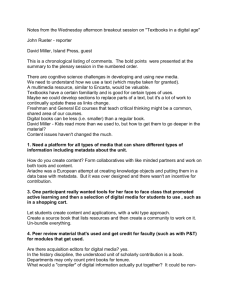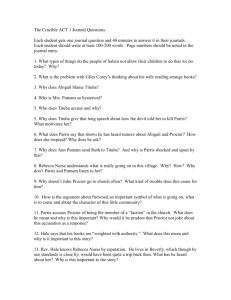The Crucible Act One Study Guide & Analysis
advertisement
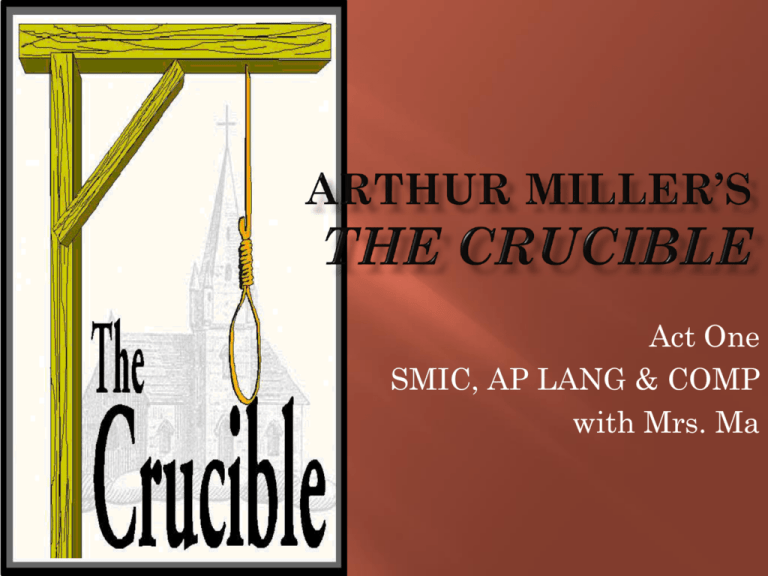
Act One SMIC, AP LANG & COMP with Mrs. Ma This play is not history in the sense in which the word is used by the academic historian. Dramatic purposed have sometimes required many characters to be fused into one; the number of girls involved in the “crying-out” has been reduced; Abigail’s age has been raised; while there were several judges of almost equal authority, I have symbolized them all in Hathorne and Danforth. However, I believe that the reader will discover here the essential nature of one of the strangest and most awful chapters in human history. The fate of each character is exactly And there is no one in the drama who did not plan a similar – and in some cases exactly the same- role in history. As for the characters of the persons, little is known about most of them except in what may be surmised from a few letters, the trial record, certain broadsides written at the time, and references to their conduct in source of varying reliability. They may therefore be taken as creations of my own, drawn to the best of my ability in conformity with their known behavior, except as indicated in the commentary I have written for this text. Arthur Miller, The Crucible What happened in Act One? Discuss the significance of Miller’s extensive notes (essays) regarding the historical background of the play and actions. Miller’s general purpose is to inform, but are there instances where Miller’s present-tense voice intrudes into his commentary? Do you find this informative passage helpful or counterproductive? If directing the production of this play on stage, how would you convey this information to the audience? Written in 1953, Miller deliberately crafted authentic language for his characters that differs from modern language. Miller used examples of writing from the late 17th century as models; he wanted the characters’ language to sound realistic for that time period. It works because so often the characters’ way of speaking seem awkward or out of date. Can you find examples? What are the meanings of: Sport (line 93) Dumb (line 101) Compromise (line 125) White (line 128) Discharged (line 132) Cold (line 138) Element (line 198) Pray (line 201) In pairs/trios, answer and then report to class. Why use the contractions in the text, especially contractions that replace the final g in the –ing ending? Layin’ (line 211) Nothin’ (line 218) Pullin’ (line 221) and several others throughout Answer: These shortened endings recreate the sound of informal, excited, rushed speech and show the character of the person speaking. Examine Miller’s description of Ann Putnam pg 144, Thomas Putnam pg 145 John Proctor pg 148 Rebecca Nurse pg 150 Giles Corey pg 151 Miller complicates the plot by revealing conflicts between various Salemites. Using the mini-essays, can you pair characters who are in conflicts and briefly describe what lies between them in the past and present? Example, LAND: Francis Nurse had a land war with a Putnam relative (past); Putnam may be among those in Salem who resent Nurse’s social status (present). As Miller waxes philosophical in his mini-essays, his diction becomes more difficult. What are some examples of this found in the mini-essay on pp 155-158? Propitiation “an act that calms or pleases someone” Klatches “gatherings” Fetishes “objects believed to have magical power” Resurgence “return” or “revival” Mores “accepted standards of behavior” Laxity “looseness” Atomization “breakup” Yeomanry “farmers (as a group)” Tracts “religious writings” Re-read Parris’s comment in lines 804-805, pg 158 What literary device does Miller use in these lines? Explain the metaphor. Is there a more delicate way of saying this? Do you think Miller intended Giles’s remarks to be humorous in lines 814831? Discuss why Miller might add humor to this scene. Reread the exchange between Abigail, Hale, and Tituba in lines 905-937. This scene is important to the plot because it shed’s light on Abigail’s motives. What does Abigail say Tituba made her do? Why does Abigail accuse Tituba of witchcraft? Why would Abigail single out Tituba instead of one of the other girls? How does Miller differentiate Tituba’s character from the others? Give examples. What literary device? Why does he do this? To remind us that Tituba is not a native speaker of English. It is not surprising to hear her speak in dialect, reflecting her upbringing in the culture of Barbados. In the right hand column of page 162, accusations boost the plot complexity and emotional intensity of the play. Whose example finally compels Betty to rise and speak? What does she say? Why does Betty cry out “with great relief”? Why does Hale seem relieved? Why does Hale want the marshal to come with “irons”? Which Salemites do you think the marshal will visit? Read Act Two!
